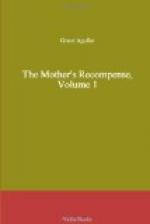heart feel breaking, yet our prayers will be heard
and accepted on high. It is not with you, my
poor girl, the weak indulgence of sorrow that ever
prostrates you on a couch of suffering, it is the
struggle of resignation and concealment that is too
fierce for the delicacy of your constitution; and
do you not think that strife is marked by Him, who,
as a father, pitieth His children? Painful as
it is to you, my dear Mary, your sufferings may be
in a degree a source of mercy to your mother.
Agonizing as it is to the heart of a parent, to watch
the fevered couch of a beloved child, yet had she not
that anxiety, the conduct of your father and brother
might present still deeper wretchedness. For
your sake, she dismisses the harrowing thoughts that
would otherwise be her own; for your sake, she rallies
her own energies, which else might desert her; and
when you are restored to her, when, in those intervals
of peace which are sometimes your own, she sees you
in health, and feels your constant devotion, believe
me, there is a well of comfort, of blessed comfort
in her fond heart, of which nothing can deprive her.
For her sake, then, my dearest Mary, try to conquer
this reluctance to leave England. I do not reproach
your grief, for I know that it is natural. But
endeavour to think that this residence for a few years
on the Continent, may restore your mother to a degree
of peace, which, in England, at present she cannot
know; and will not this thought, my love, reconcile
you to a short separation from the land of your birth,
and the friends you so dearly love? We shall all
think of and love our Mary, however widely parted.
We will write very frequently, and every information
I can obtain of your brother shall be faithfully recorded.
Mr. Hamilton has ever felt for your mother as a brother
would, and for her sake, her misguided son will be
ever an object of his dearest care. Do not fear
for him, and endeavour to soothe your mother’s
anxiety on that head also. Herbert has written
to you, I enclose his letter; and he entreats most
earnestly that you will not only permit him to continue
to write, but answer him, during your residence abroad.
He has been deeply grieved at the intelligence we
have reported of you, and I hope and think, if your
mother do not disapprove of your correspondence, that
the humble yet fervent faith which breathes in the
religion of my son may long prove a source of consolation
as well as interest to you, who, from your childhood,
could sympathise with all his exalted feelings.
Poor Emmeline has shed many bitter tears over your
letter; she cannot bear to think of your leaving England,
but yet agrees with me in believing it will be a beneficial
change for both yourself and Mrs. Greville, but her
letter shall speak her own feelings. I will not
write more now, but will very soon again. Do not
exert yourself too much to answer either Emmeline
or myself; we will not wait for regular replies.
I have written to your mother also, therefore this
brief epistle is entirely for yourself, as you wished
it. Mr. Hamilton will meet you at Dover, which
will afford me much satisfaction, as I shall know
more than I could ever learn by a letter, and he will,
I trust, be enabled to set your mother’s heart
at rest on some points which must be now subjects
of anxiety. God bless you, my Mary, and restore
you speedily to health and peace.




